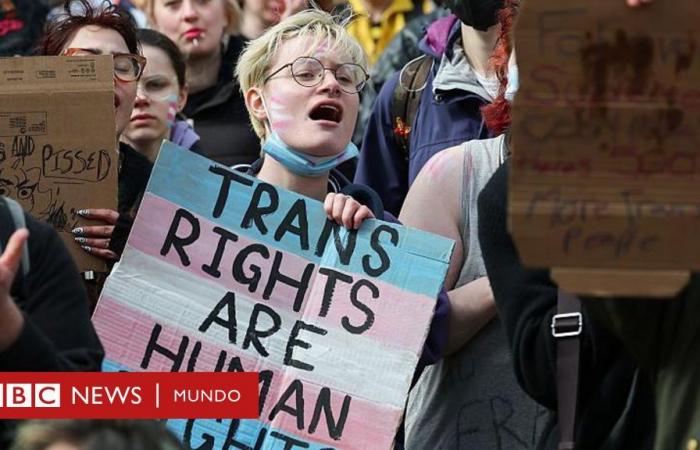
Image source, Getty Images
- Author, Writing
- Author’s title, BBC News World
-
6 hours
The United Kingdom Supreme Court ruled in April that the definition of women must be based on the biological sex assigned at birth, that is, transgender women do not enter into the legal definition of women.
That, even if they have a gender recognition certificate (CRG).
“The concept of sex is binary, a person is a woman or man,” said the court.
British judges ruled that the terms “woman” and “sex” in the Equality Law refer to a biological woman and biological sex.
It also makes it clear that if a space or service is designated as exclusive to women, a person born man but identifies as a woman has no right to use it.
The Supreme Court argued that this was the only consistent and coherent interpretation.
And this historic failure is already having concrete consequences in the United Kingdom.
Veto in football in England
The Football Association (FA) announced on Thursday, May 1 that transgender women can no longer play in women’s football in England as of June 1.
The FA had already modified its regulation on April 11 and applied more strict eligibility criteria – such as demonstrating certain testosterone levels in the last 12 months or providing a hormonal therapy history – so that transgender women could continue playing in women’s football at all levels.
But after the Supreme Court judgment on April 15, he repealed his policy and now only biologically born women will be allowed to play.
“This is a complex issue, and our position has always been that if there was a substantial change in the legislation, science or functioning of policy in base football, we would review it and modify if necessary,” the FA said.
“We understand that this will be difficult for those who simply want to practice the sport they are passionate about with the genre with which they identify, and we are getting in touch with the registered transgender women who currently play to explain the changes and see how they can continue to participate in the sport.”
Image source, Getty Images
Last month, the FA reported that there were 20 transgender women registered among the millions of amateur players. There is no transgender woman recorded in professional football in countries of origin.
Last week, the Kick It Out anti -discrimination group said that the Supreme Court ruling would have “high -range consequences” and urged that “all in the football community were treated with respect and compassion.”
Fiona McAnena, director of campaigns of the beneficial human rights organization Sex Matters, said that the decision was “late” and that the previous policy was “absurd”.
After the ruling of the Supreme Court, Natalie Washington, leader of the Football Campaign vs. Transobia told BBC Sport that there would be an increase in abuses against transgender people.
“I am sure that we will see greater reluctance on the part of the transgender people to participate in sports and physical activity,” he said.
“Whenever there is a legal or government resolution in this regard, or an organization is positioned, there is a rebound of abuse.”
FA is the first important sports body that modifies its eligibility criteria for transgender people after the Supreme Court ruling.
Use of bathrooms
One of the measures that was immediately deduced from the failure was the use of the bathroom.
The Minister of Equality, Bridget Phillipson said in statements to the BBC that trans women should use baths according to their biological sex.
Phillipson did not explicitly say that trans women should use male baths. However, he declared in the BBC Radio 4 program: “The ruling was clear when affirming that access to benefits and services must be based on biological sex.”
When pressed to clarify whether a trans woman should use male or female baths, she reiterated: “The failure is clear.”
Previously, Phillipson said that the law on the access of trans women to separate spaces by sex based on biological sex “would apply generalized.”
However, he emphasized that the Commission for Equality and Human Rights (CEDH) “will establish additional guidelines and a statutory practices code, because we need to ensure that all people have the possibility of accessing safe and appropriate services, which respect their privacy and dignity.”
In particular, it was necessary that there be “appropriate and available services for all people, including trans people”, in terms of environments such as hospitals and changing rooms.
When pressed on the implications of the failure for trans women who seek to use a bath today, he replied: “The ruling was clear that access to provisions and services should be based on biological sex. But I know that many companies, large and small, will ensure the appropriate services; for example, many have opted for unisex services or separate cubicles that anyone can use.”
For its part, the Commission on Equality and Human Rights (EHRC) published a provisional guide on how organizations must interpret the decision of the Supreme Court of the United Kingdom that establishes that women are defined by their biological sex in the law.
The new guide says that, in places such as hospitals, stores and restaurants, “transfers (biological men) should not be allowed to use women’s facilities.” He also states that trans people should not run out of facilities available.
The guide also establishes that “in some circumstances the law also allows trans women (biological men) to be allowed to use men’s facilities, and trans (biological women) are not allowed to use the facilities for women.”
The EHRC guide adds: “However, when there are facilities available for both men and women, trans people should not be seen in a situation where there are no facilities that can use.”
Subscribe here To our new newsletter to receive every Friday a selection of our best content of the week.
And remember that you can receive notifications in our app. Download the latest version and act.





